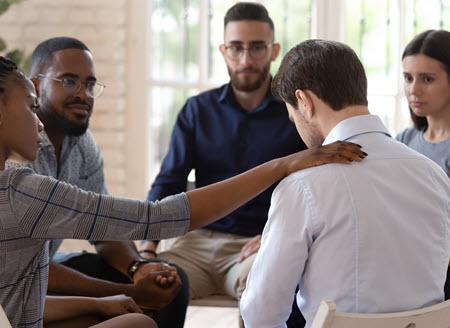 What is grief?
What is grief?
Grief is the emotional pain you feel as a natural response to losing someone or something that matters to you. When grieving, you may feel a range of emotions from shock and disbelief to anger and guilt to numbness and profound sadness.
Psychiatrist Elizabeth Kubler-Ross identified five general stages of grief, which include denial, anger, bargaining, depression, and acceptance.
Contrary to popular belief, you do not have to go through each of the five stages to heal. It’s important to remember that grief is a unique journey. Grief is usually more like a roller coaster ride than a linear, stage-like process. There is no specific timetable for when you should be “done” grieving. Riding out the highs and lows will take time to find even ground.
Grief has many causes.
Examples of losses include death of a loved one, death of a pet, divorce or a relationship breakup, a miscarriage, loss of financial stability, loss of a dream, selling or losing a home, life transitions (graduating, changing jobs, moving), loss of health, and retirement.
The loss of anything significant to you is a valid reason to grieve. The more substantial your loss, the deeper your grief will likely be. Sometimes, people feel shame for grieving losses that others deem “unimportant,” but grief and loss are personal experiences.
Permit yourself to grieve losses that are important to you. Be patient with yourself and allow the grief process to take the time that it takes for you.
Whatever the loss you are experiencing, there are healthy ways to cope with the pain, come to terms with your grief, and eventually move forward with a new perspective on life.
There are different types of grief.
Anticipatory grief includes grieving a loss before it occurs. This can happen when taking care of a terminally ill loved one or caring for an aging pet who will soon die. There can be a mix of confusing emotions, particularly anger, as you navigate the anticipation of loss. This kind of grief often leaves you emotionally drained and physically exhausted due to the overwhelming nature of the emotional strain.
Disenfranchised grief occurs when your loss is devalued, stigmatized, or doesn’t allow for open mourning. Parents of school shooters experience this kind of grief. The public understandably has little tolerance for the mourning of a killer. Disenfranchised grief is a terrible burden to bear alone.
Complicated grief typically comes with the loss of a loved one that leaves you stuck in a constant state of bereavement. You may feel that it is impossible to move on and that life isn’t worth living anymore. Daily life and relationships fall through the cracks. You may search for your loved one in familiar places and refuse to accept that they are gone. An intense longing for them consumes your every thought.
 When should you seek professional help?
When should you seek professional help?
If your grief feels like too much to bear, it may be time to get professional help. It’s natural to withdraw and want to isolate when grieving, but you need support to heal and move forward in your life. In my office, you can feel whatever you want without judgment. I won’t tell you to “move on” or to “get over it.” I will sit with you in your pain and help you process the emotions as they arise.
It’s understandable if you feel tempted to numb out or avoid the pain with drugs and alcohol. Just know that you can suppress grief, but you can’t avoid it forever.
Avoidance only prolongs the grieving process.
Unresolved grief can lead to several complications, including severe depression, substance abuse or addiction, physical health problems, and PTSD. Inability to resolve grief is particularly the case when loss results from a traumatic accident, causing you to suffer with guilt. Your brain may replay the event on an endless loop while thinking through different outcomes.
As uncomfortable and frightening as it can be, it is better to lean into the pain and get through it. I can help you build internal strength and resilience to face the complicated emotions of grieving a loss.
With help, you can become less overwhelmed by grief.
Together, we can help you process memories and events associated with the loss until they no longer overwhelm your brain and nervous system. This processing will allow you to associate your memories with positive or neutral emotions, so they are not so painful.
Contact me if you feel “stuck” in your grieving process, and let’s chat. I would love to help you get unstuck.
It’s possible to live a meaningful life after experiencing a loss. It doesn’t have to hurt forever.

